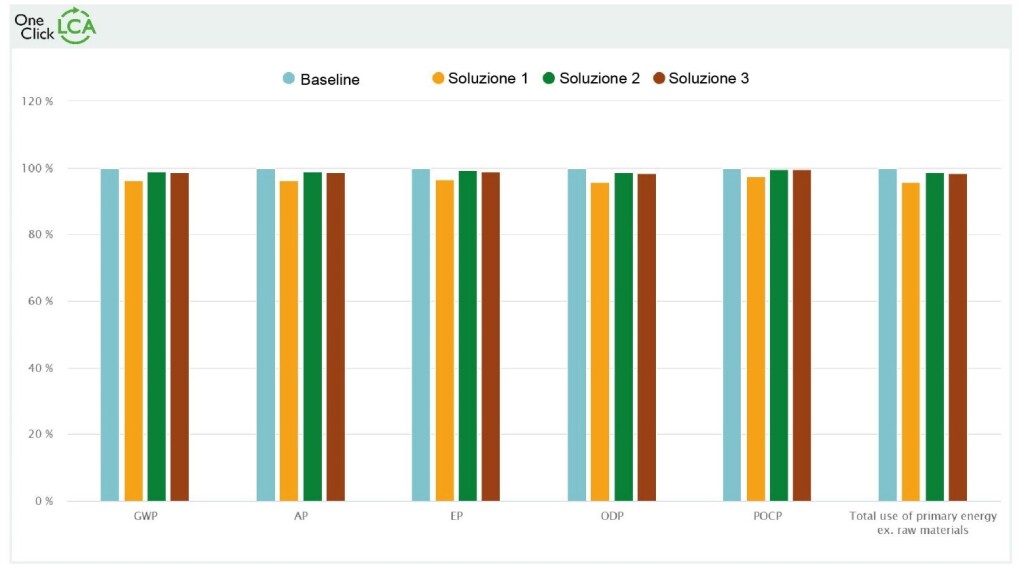AUTHOR: Lorenzo Porcelli
TUTORS: Arch. Mario Cucinella (Tutor Aziendale), Prof. Pietro Giuseppe Crespi (Tutor Accademico)
INTERNSHIP: Mario Cucinella Architects S.U.R.L.
MASTER: Master in Edifici e Infrastrutture Sostenibili a.a 2019/2020
Estendere la consapevolezza circa l’impatto degli edifici sull’intero ciclo di vita, senza soffermarsi sui soli consumi in fase di esercizio, è un tema cruciale per lo sviluppo degli edifici nei prossimi anni. Infatti, se oggi i materiali da costruzione costituiscono l’11% delle emissioni climalteranti del settore delle costruzioni, con le nuove realizzazioni previste da qui al 2050 l’impatto dei consumi e dei materiali sarà equivalente, evidenziando la crescente importanza della scelta dei materiali e delle modalità costruttive (UN Environment Global Status Report, 2017 – EIA International Energy Outlook, 2017).
L’analisi LCA è una metodologia standardizzata che permette di valutare il consumo di risorse e le emissioni quantificando i potenziali impatti sull’ambiente e sulla salute umana di un bene o di servizio, considerato in una più ampia prospettiva di ciclo di vita. Essa rappresenta un trend in crescita in tutti gli ambiti produttivi ed in particolare nell’edilizia, dove permette di identificare quali fasi della vita utile e quali scelte progettuali causano maggiori impatti negativi sull’ambiente, informando una riflessione su possibili alternative migliorative.
Nello specifico, la tesi ha come obiettivo l’ottimizzazione parametrica, in fase di concept, di un sistema di schermatura solare per una facciata ovest di un edificio per uffici situato a Milano.
In particolare, verrà sviluppato un processo di Multi-Objective Evolutionary Optimization tramite l’utilizzo di Octopus (plug-in di Grasshopper) che permetterà di ottimizzare le prestazioni del sistema schermante dal punto di vista della radiazione solare diretta valutata con Ladybug (plug-in di Grasshopper) e, al contempo, l’analisi LCA dell’edificio (OneClick LCA).
Per ciò che riguarda l’analisi LCA, viene posta attenzione soprattutto al calcolo della quantità di CO2 equivalente incorporata ed emessa durante le diverse fasi del ciclo di vita del sistema considerato, in accordo con gli standard internazionali (EN 15978:2011) e successive guide di settore (come quella fornita dal RICS – Royal Institution of Chartered Surveyors).
FOR INTERNATIONAL STUDENTS:
Extending awareness about the impact of buildings on the entire life cycle, without focusing only on operational energy consumption, is a crucial issue for the development of buildings in the next years.
Today, building materials cause the 11% of the greenhouse gas emissions of the construction sector. It is expected that the impact of these materials linked to the new buildings planned by the year 2050 will be equivalent to the impact of operational energy consumption, highlighting the growing importance of the choice of materials and construction methods (UN Environment Global Status Report, 2017 – EIA International Energy Outlook, 2017).
LCA analysis is a standardized methodology that allows to evaluate the consumption of resources and emissions by quantifying the potential impacts on the environment and human health of a good or service, considered in a broader life cycle perspective. It represents a growing trend in all production areas and, in particular, in the construction business, where it allows to identify which life stages and design choices cause the negative impacts on the environment, giving possible alternatives for improvement.
In particular, the thesis aims at the parametric optimization, in the concept phase, of a solar shading system for a west facade of an office building located in Milan.
In particular, a Multi-Objective Evolutionary Optimization process will be developed through the use of Octopus (Grasshopper plug-in) which allows to optimize the performance of the shading system from the point of view of direct solar radiation evaluated with Ladybug (plug-in by Grasshopper) and, at the same time, the LCA analysis of the building (OneClick LCA).
As regards the LCA analysis, attention is paid to the calculation of the amount of CO2 equivalent incorporated and emitted during the different phases of the life cycle of the system considered, in accordance with international standards (EN 15978: 2011) and sector guidance (such as RICS – Royal Institution of Chartered Surveyors).


